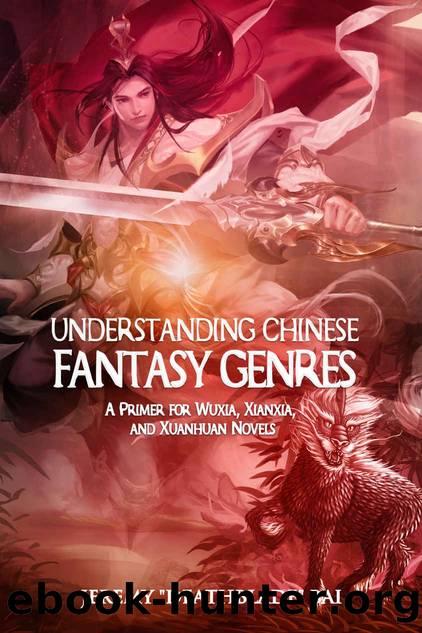Understanding Chinese Fantasy Genres: A primer for wuxia, xianxia, and xuanhuan by Jeremy Bai

Author:Jeremy Bai [Bai, Jeremy & Bai, Jeremy]
Language: eng
Format: epub
Published: 2020-12-15T06:00:00+00:00
Part 3: Magical Aspects
Chapter 12: Differences between Daoist Magics, Divine Abilities, and Magical Techniques
Throughout his years of practicing cultivation, Meng Hao had acquired all sorts of divine abilities and magical techniques. Not many of them left him moved, or left him with a feeling that the technique was especially powerful....
âYou canât escape,â he said. âNo matter what you say, Iâm going to catch you!â His eyes flickered coldly, and his heart beat with excitement. As far as he was concerned, this pink-robed young woman was a treasure trove of divine abilities and Daoist magics.
I Shall Seal the Heavens â Er Gen
What are Daoist magics, divine abilities and magical techniques? What are the differences and similarities between them? How are they used in novels?
What I usually translate as Daoist magic is daofa (éæ³). Dictionaries usually define it as âa magic artâ of some sort, generally associated with Daoism, but not exclusively. It could be a Buddhist technique. The term can also have definitions that donât relate to fantasy settings.
Divine abilities are shentong(ç¥é), which Iâve seen translated in a variety of ways. For instance, translators might use âmagic powerâ or âsupernatural power,â and there are even more mundane ways to translate it, as itâs a common word used in everyday speech to refer to amazing skill, talent, etc. I usually use âdivine abilityâ because the character shen(ç¥) has a connection with gods or divine beings.
Magical techniques are shufa (æ¯æ³), which I have not found explained in any Chinese-English dictionaries that I use, and I use around 20-30. In the works Iâve translated, magical techniques are a wide variety of skills and ability that could range from magic to witchcraft. And I have never seen a detailed definition of them in the narrative of any story Iâve translated.
The main question I usually see asked is: how can we identify the similarities and differences? The short answer is that you canât.
In the works Iâve translated, Iâve seen all of these words used synonymously. I have seen some authors imply that divine abilities are more powerful than magical techniques, only to contradict this definition in same body of work. And in terms of function, both divine abilities and magical techniques essentially do the same thing as Daoist magics. Iâve even seen the terms used interchangeably within the context of one chapter or even paragraph.
Keep in mind, they are real-life terms that authors have appropriated to use in Chinese fantasy novels, so when I say theyâre all the same, donât forget that the authors are entitled to do whatever they want in their work. Itâs the same in English. If youâre making up your own fantasy world, you might make the rule that âmagical spellsâ require physical components, but âincantationsâ only need verbal elements. In other words, the fictional definitions might not necessarily match up to the real-life definitions. Thatâs the beauty of writing fiction.
In Chinese fantasy novels, itâs the same. In the end, itâs best to read carefully and wait for the author to explain the terms, either by definition in the narrative, or better yet, by showing and not telling.
Download
This site does not store any files on its server. We only index and link to content provided by other sites. Please contact the content providers to delete copyright contents if any and email us, we'll remove relevant links or contents immediately.
The Power of Myth by Joseph Campbell & Bill Moyers(1068)
A Social History of the Media by Peter Burke & Peter Burke(988)
Half Moon Bay by Jonathan Kellerman & Jesse Kellerman(987)
Inseparable by Emma Donoghue(983)
The Nets of Modernism: Henry James, Virginia Woolf, James Joyce, and Sigmund Freud by Maud Ellmann(914)
The Spike by Mark Humphries;(812)
The Complete Correspondence 1928-1940 by Theodor W. Adorno & Walter Benjamin(789)
A Theory of Narrative Drawing by Simon Grennan(783)
Culture by Terry Eagleton(776)
Ideology by Eagleton Terry;(743)
World Philology by(719)
Farnsworth's Classical English Rhetoric by Ward Farnsworth(718)
Game of Thrones and Philosophy by William Irwin(712)
Bodies from the Library 3 by Tony Medawar(709)
High Albania by M. Edith Durham(705)
Adam Smith by Jonathan Conlin(695)
A Reader’s Companion to J. D. Salinger’s The Catcher in the Rye by Peter Beidler(689)
Comic Genius: Portraits of Funny People by(654)
Monkey King by Wu Cheng'en(654)
